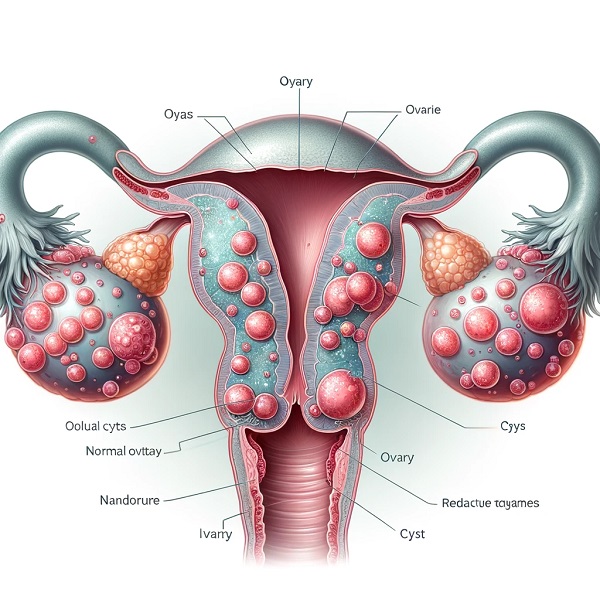
Understanding PCOS: A Comprehensive Guide
Kay
- 0
What is PCOS?
Polycystic Ovary Syndrome is an endocrine disorder that affects a significant percentage of women of reproductive age. It is characterised by oligomenorrhoea (infrequent or prolonged menstrual periods), hyperandrogenism (excessive androgen levels), and polycystic ovaries (ovaries with multiple cysts). Sounds scientific, but essentially you have an endocrine disease that means your ovaries are overproducing something we call male sex hormones, or androgens, that are normally produced in small quantities in women.
Prevalence and Impact
PCOS affects about 1 in 10 women of childbearing age – that’s a lot of women wrestling with its symptoms. These aren’t ‘minor’ symptoms either; PCOS can have a considerable impact on emotional and mental health.
Causes of PCOS
Genetic Factors
Estrogen is thought to be the most significant of the culprits: genetics plays a big role in PCOS, so if your mum or sister has it, chances are you do as well. Scientists are still working to identify exactly which genes are responsible, but it’s clear that PCOS likes to run in the family.
Hormonal Imbalance
Hormones also play a major role. Women with PCOS might have elevated levels of androgens, a hormonal imbalance that can contribute to many of the symptoms.
Lifestyle and Environmental Factors
Your lifestyle makes a difference too – poor diet, lack of proper exercise, and exposure to environmental toxins are known factors. PCOS symptoms can be managed by maintaining a healthy lifestyle.
Symptoms of PCOS
Irregular Menstrual Cycles
One of the most common symptoms of PCOS is irregular periods – either fewer than usual, or longer or heavier periods.
Excess Androgen and Its Effects
High androgen levels can manifest as hirsutism (increased facial and body hair), severe acne and male-pattern hair loss – symptoms that can be especially upsetting to women.
Other Common Symptoms
PCOS also results in weight gain, particularly visceral fat around the abdomen, as well as skin tags, dark patches of skin on the neck, armpits or groin, and even headaches. All women’s experience of PCOS can differ so vastly.
Diagnosing PCOS
Medical History and Physical Examination
The usual way to diagnose PCOS is with a thorough medical history and physical exam; your doctor will want to ask you about your periods, how certain symptoms are affecting you, and any weight changes you’ve seen.
Blood Tests and Ultrasounds
Blood tests can measure the level of hormones in your body, and also check for other conditions that can contribute to similar symptoms. An ultrasound to look at your ovaries can also help confirm a diagnosis of PCOS, which also involves checking the thickness of the uterus lining.
Differential Diagnosis
Because the symptoms of this disease can be overlapping with those of other conditions, your doctor will likely investigate other possible causes of your symptoms before diagnosing PCOS.
Treatment and Management Options
Diet and Nutrition
Another easy way to help manage PCOS is to eat a healthy diet. Choosing a balanced diet full of fruit, veg, lean proteins and whole grains can help balance your blood sugar levels and help with your overall health.
Exercise and Physical Activity
Another essential component is regular physical activity. Exercise helps you keep your weight down and promotes healthy blood sugar levels. Exercise at a moderate rate for at least 30 minutes on most days of the week.
Medications
Hormonal Treatments
Pills that minimize fluctuations in your menstrual cycle, like the birth control pill, can also diminish androgen levels and reduce excess hair growth and acne.
Insulin-Sensitizing Drugs
Drugs that can assist the ovulation – such as Metformin, which acts to make the patient more insulin sensitive and lose weight; Clomid, which further stimulates the ovaries and their response to the egg hormones; or Follicle Stimulating Hormone (FSH), which promotes the ovary’s development and egg release – can also be appointed.
Surgical Options
Surgery could sometimes be an option too, including ovarian drilling that helps to bring down androgen levels and stimulate ovulation. But these approaches will generally be considered only after other treatment options have failed.
PCOS and Fertility
How PCOS Affects Fertility
Anovulation and Irregular Ovulation
One of the main ways PCOS impairs fertility is by interfering with the process of ovulation. Many PCOS patients suffer from anovulation, which involves having no period (or a delayed, irregular period) because the ovaries are unable to release an egg during the menstrual cycle. In addition, even when ovulation does take place, it can occur infrequently and in an unpredictable manner, making it more difficult to reliably predict fertile windows.
Insulin Resistance and Its Impact
Since women with PCOS tend to be insulin resistant, this means that their bloodstream has high levels of insulin. High levels of insulin can in turn affect the woman’s ovaries to secrete higher levels of androgens, which contributes to the failure of ovulation. High levels of insulin also can affect the endometrial lining of the uterus, making it thinner and less capable of implanting a fertilized egg.
Endometrial Health
Women with PCOS often have problems with the endometrial lining of their uterus, too: erratic periods can create buildup of the lining, leading to heavy and prolonged periods when they do come. This variability can also create a somewhat hostile environment for implantation and pregnancy.
Miscarriage Risk
Some studies suggest that PCOS increases the risk of miscarriage, particularly early in pregnancy, where hormonal and insulin abnormalities can affect egg quality and the overall reproductive environment.
Fertility Treatments for Women with PCOS
Ovulation Induction
Clomiphene (Clomid) and Letrozole (Femara) are medications that stimulate ovulation, prompting ovulation more regularly so as to increase the chances of conception. Gonadotropins, a class of injectable hormones, are used as well, though owing to the higher risk of multiple pregnancies these medications must be carefully monitored.
Assisted Reproductive Technologies (ART)
Alternatively, where drugs fail, Assisted Reproductive Technologies (ART) such as IVF provide another option. IVF involves ovarian stimulation so eggs can be retrieved, sometimes even multiple ones, fertilized outside the body and thereafter transferred into the womb.
Lifestyle and Weight Management
Simply making sure one stays at a normal weight through diet and exercise can help with insulin sensitivity and hormonal balance, all factors that allow fertility treatments to work. In women with PCOS, even just a 5-to-10 per cent weight loss can improve ovulation and fertility outcomes.
Living with PCOS
Coping Strategies
Amid the challenges that living with PCOS presents, there are strategies that individuals can adopt to manage the condition. Finding online peer-supported communities or PCOS support groups has resulted in tremendously positive feedback from our readers. Whether it’s sharing advice and tips on fertility issues or experiencing the support of others who ‘get’ what they’re going through, the reward for investing their time in such platforms has been particularly gratifying.
Mental Health Considerations
PCOS can be incredibly taxing on your mental health, and if you ever feel overwhelmed, anxious or depressed, you should talk through these with a mental health practitioner at the earliest. Talking therapy, counselling and sometimes medication also can help manage the emotional aspects of PCOS.
PCOS Myths and Facts
Common Misconceptions
This is one of many PCOS myths, including cysts on the ovaries being the ‘root cause’, or that it is due to what she did wrong to cause the symptoms.
Evidence-Based Facts
PCOS does not come in a one-size-fits-all package, either in its symptoms or its causes. Whereas insulin resistance and obesity have a role in the aetiology of the disease, thin women can have PCOS, too.
Conclusion
For those living with PCOS, the ride can be bumpy. You are a strong and dynamic force and knowing more about PCOS; its symptoms and how you can manage this condition with the help of health professionals will make a difference.
FAQs
What is the main cause of PCOS?
PCOS is a multifactorial condition with both genetic and environmental factors, and with excess androgens as its major hormonal basis.
Can PCOS be cured?
Although there is no cure, PCOS’s symptoms can be treated with lifestyle modifications, medicines, or other therapies.
Is it possible to get pregnant with PCOS?
This is increasingly true for many women with PCOS, who can conceive with fertility treatments and lifestyle changes.
Does weight loss help with PCOS?
Sure, weight loss is likely to help PCOS symptoms, lower hormone levels, and improve your chances of ovulation.
Can PCOS cause other health problems?
True, PCOS has been associated with an increase in other health problems, including type 2 diabetes, high blood pressure and heart disease. Preventing these complications depends on the effective control of PCOS.
Samsung Galaxy Z Fold2 LG K40 LG Velvet Samsung Galaxy Z Fold2 Samsung Galaxy Z Fold2 LG V60 ThinQ LG K40 Samsung Galaxy A51 Samsung Note 20 iPhone XR


